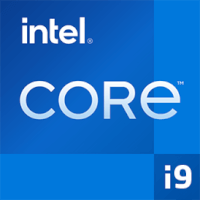Intel Core i9-11900KF
The Intel Core i9-11900KF operates with 8 cores and 16 CPU threads. It run at 5.30 GHz base 4.80 GHz all cores while the TDP is set at 125 W.The processor is attached to the LGA 1200 CPU socket. This version includes 16.00 MB of L3 cache on one chip, supports 2 memory channels to support DDR4-3200 RAM and features 4.0 PCIe Gen 20 lanes. Tjunction keeps below 100 °C degrees C. In particular, Rocket Lake S Architecture is enhanced with 14 nm technology and supports VT-x, VT-x EPT, VT-d. The product was launched on Q1/2021

| Frequency | 3.50 GHz |
| CPU Cores | 8 |
| CPU Threads | 16 |
| Turbo (1 Core) | 5.30 GHz |
| Turbo (8 Cores): | 4.80 GHz |
| Hyperthreading | Yes |
| Overclocking | Yes |
| Core Architecture | normal |
Where to Buy?
Buy Intel Core i9-11900KF
Memory & PCIe
| Memory type | DDR4-3200 |
| Max memory | 128 GB |
| Memory channels | 2 |
| ECC | No |
| Bandwidth | 51.2 GB/s |
| PCIe | 4.0 x 20 |
Encryption
| AES-NI | Yes |
Internal Graphics
| Memory type | DDR4-3200 |
| GPU name | no iGPU |
| GPU frequency | |
| GPU (Turbo) | No turbo |
| Generation | |
| DirectX Version | |
| Execution units | |
| Shader | |
| Max memory | -- |
| Max. displays | |
| Technology | 14 nm |
| Release date |
Technical details
| Instruction set (ISA) | x86-64 (64 bit) |
| Architecture | Rocket Lake S |
| L2-Cache | 4.00 MB |
| L3-Cache | 16.00 MB |
| Technology | 14 nm |
| Release date | Q1/2021 |
| Socket | LGA 1200 |
Thermal Management
| TDP (PL1) | 125 W |
| TDP (PL2) | 251 W / 56 s |
| TDP Up | -- |
| TDP Down | 95 W |
| Tjunction max | 100 °C |
Cinebench R23 (Single-Core)
Cinebench R23 is the successor of Cinebench R20 and is also based on the Cinema 4 Suite. Cinema 4 is a worldwide used software to create 3D forms. The single-core test only uses one CPU core, the amount of cores or hyperthreading ability doesn't count.
Cinebench R23 (Multi-Core)
Cinebench R23 is the successor of Cinebench R20 and is also based on the Cinema 4 Suite. Cinema 4 is a worldwide used software to create 3D forms. The multi-core test involves all CPU cores and taks a big advantage of hyperthreading.
Cinebench R20 (Single-Core)
Cinebench R20 is the successor of Cinebench R15 and is also based on the Cinema 4 Suite. Cinema 4 is a worldwide used software to create 3D forms. The single-core test only uses one CPU core, the amount of cores or hyperthreading ability doesn't count.
Cinebench R20 (Multi-Core)
Cinebench R20 is the successor of Cinebench R15 and is also based on the Cinema 4 Suite. Cinema 4 is a worldwide used software to create 3D forms. The multi-core test involves all CPU cores and taks a big advantage of hyperthreading.
Geekbench 5, 64bit (Single-Core)
Geekbench 5 is a cross plattform benchmark that heavily uses the systems memory. A fast memory will push the result a lot. The single-core test only uses one CPU core, the amount of cores or hyperthreading ability doesn't count.
Geekbench 5, 64bit (Multi-Core)
Geekbench 5 is a cross plattform benchmark that heavily uses the systems memory. A fast memory will push the result a lot. The multi-core test involves all CPU cores and taks a big advantage of hyperthreading.
Estimated results for PassMark CPU Mark
Some of the CPUs listed below have been benchmarked by CPU-Comparison. However the majority of CPUs have not been tested and the results have been estimated by a CPU-Comparison’s secret proprietary formula. As such they do not accurately reflect the actual Passmark CPU mark values and are not endorsed by PassMark Software Pty Ltd.
Monero Hashrate kH/s
The crypto currency Monero has been using the RandomX algorithm since November 2019. This PoW (proof of work) algorithm can only efficiently be calculated using a processor (CPU) or a graphics card (GPU). The CryptoNight algorithm was used for Monero until November 2019, but it could be calculated using ASICs. RandomX benefits from a high number of CPU cores, cache and a fast connection of the memory via as many memory channels as possible
Cinebench R15 (Single-Core)
Cinebench R15 is the successor of Cinebench 11.5 and is also based on the Cinema 4 Suite. Cinema 4 is a worldwide used software to create 3D forms. The single-core test only uses one CPU core, the amount of cores or hyperthreading ability doesn't count.
Cinebench R15 (Multi-Core)
Cinebench R15 is the successor of Cinebench 11.5 and is also based on the Cinema 4 Suite. Cinema 4 is a worldwide used software to create 3D forms. The multi-core test involves all CPU cores and taks a big advantage of hyperthreading.


